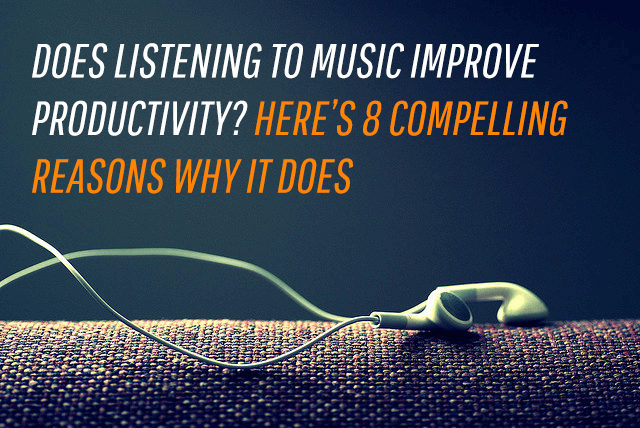Does listening to music at work improve productivity? Here’s 8 compelling reasons why it does

Brad and I wrote a little while back about wearing headphones at the office. He noticed I was wearing them more often and we had some issues when he would try to get my attention. So we shared about it on LinkedIn, and it generated a storm of comments from people with polar opposite views — either they thought it was totally unacceptable, or it was okay with some adjustments (only use one ear bud instead of two.) Many people noted listening to music hurts productivity. And some others noted it music helps them improve productivity.
So, I did some research to get to the bottom of it. I can “say” it helps me, but that’s subjective. So I wanted to find some real studies that proved it actually does help productivity.
1. Music improves productivity and attitude
Teresa Lesuik released this study from the University of Windsor, Canada that examined 56 developers working at a Canadian software company. The findings showed that positive affect and quality of work were at their lowest when music wasn’t present in the working environment, and that tasks generally took longer. Overall, positive mood alteration and increased productivity were evident with music playing at work—so this study would suggest a very pro-music argument.
2. Music helps you regain concentration at work
There’s nothing worse than being enveloped by the sounds and distractions in the workplace around you. The copier is humming, phones are ringing, and five different conversations are happening in close proximity. Sometimes, drowning out that noise can help you get back in the zone. Dr. Sood, at the Mayo Clinic, said it takes just 15 minutes to a half-hour of listening time to regain concentration. Music without lyrics usually works best, he said.
3. Music improves morale and work environment
The music industry has new proof you should listen to music while you work (and it’s not out of self-interest.) In a survey commissioned by U.K. licensing organizations PPL and PRS for Music, 77 percent of surveyed businesses say playing music in the workplace increases staff morale and improves the atmosphere. Which would you choose for your work day: Crickets, office white noise, or music? (I pick music!)
4. Music helps you work faster and more efficiently
Personally, when I listen to music, it’s best when I have to do work that doesn’t require a lot of deep thinking. Repetitive tasks for example — I jam along, my brain goes on autopilot, and I often lose track of time. Don’t believe my personal testimony? Here’s a study that proves it:
Fox and Embrey found from a study in 1972 that listening to background music helped improve the efficiency of performing a repetitive task—even when competing with machine noise. More specifically, this study found that productivity increased when workplace music was in a Major mode.
5. Music helps create personal space
All the offices I’ve ever worked in have been open offices. I remember one office in particular; I shared a loft wall with another person. It was always dead silent, and when it came to lunch time, I could hear her chewing (hearing people eat is one of my pet peeves.) I would often go to the bathroom to avoid listening to it.
In my current role, I’ve realized it’s more about balancing out my personality and creating a space of my own. I’m still in an open office setup where most of the day I’m doing serious tasks like working with business owners and writing/editing HTML, but in my free time, I’m a musician and songwriter. Music is a huge part of me, so listening to it at work helps create some “me” space. This lawyer in the New York Times agrees:
“I do these very serious things, reviewing insurance policies and evaluating risk and liability exposure,” Mr. Enders said. “A big part of my personality is the artistic side, and music helps me balance who I am as an individual with what I’m doing at work.”
6. Music without lyrics works best
Because we’re talking about productivity and music, one of the major questions I had for this piece was about what type of music works best. This study showed that because music with lyrics can become distracting, instrumental songs work best for positively effecting productivity. After all, it’s easy to get sidetracked when you’re focusing on singing along to words. And ever hear that listening to classical music while studying helps boost concentration? Same vein.
7. Music influences your behavior (whether you realize it or not)
Have you ever noticed when you go into a fast food restaurant like McDonalds the music is much more upbeat? But if you go to the grocery store or a department store, the music is way more relaxed (think Rod Stewart’s “Have I Told You Lately?”) There’s a reason for that! Fast food restaurants have faster, upbeat songs to encourage turnaround. Department stores and grocery stores have slower, smoother, easy-on-the-ear soundtracks to slow you down — because research shows the longer you stay in the store, the more you’ll buy.
Music affects your mood and influences your behavior and decision making. Muzak is a company that provides soundtracks for businesses based on this science. (And make a lot of money doing it)
Let me put it another way — when you listen to music while running, what do you usually listen to? Lullabies? No. You listen to fast, upbeat intense music to help pump you up.
8. Music has a significant effect on culture
Muzak also positions themselves as selling music to help you ‘brand’ your company. What does the music you play say about your business?
Think about the distinct differences in music through different eras—it speaks volumes of a period in society. Any musicologist would tell you the economic and cultural environments of different eras play a huge role in shaping the types of popular music during that age. There are whole university courses dedicated to the topic.
An easy example — the 60s were heavily influenced by the younger generation of that era and have a unique ‘psychedelic’ type sound, in which drugs and the post Vietnam/peace movement played a huge role. In the same way, the music (or Musak) a company plays is an expression of the culture there as well as the identity of the brand.
So, as you can see, music affects workflow on many different levels. Now that we’ve got some hard statistics and scholarly proof on the table, has your opinion changed on music’s place in the work environment? Or would you still argue that it’s more of a case-by-case basis?
Photo credit: Fey Ilyas
